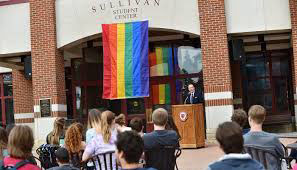Being LGBTQ+ in a heteronormative world is no joke. However, realizing that LGBTQ+ experience and culture are not universal is yet another challenge in finding our position in society and activism. As an international student, navigating the LGBTQ+ scenario at SLU with comments about issues in “developing countries” and the predominantly white culture surrounding being “queer’’ was not easy. As a Brazilian woman, I started to question how much I was a part of the “LGBTQ+ community” I saw represented here. At first, I thought it was only a process of cultural adaptation, getting used to “how things work here”. But later I started to feel that my discomfort was signaling broader issues I identified with the mainstream queer discourse.
My personal experience helped me realize the need to tackle the impacts of whitewashing and colonialism on the LGBTQ+ struggle. I am tired of the patronizing way people refer to countries/communities where LGBTQ+ people currently have ‘less rights’ as if they are innately backward. Further, it sickens me to see the condescending way in which people disregard the agency of queer people in interpreting and acting upon their oppression without the “blessing of Western Influence”.
This carries a fundamental contradiction because it masks the very role of Western colonial power in suppressing cultural systems in which gender and sexual diversity were widely accepted. Western colonial power did and continues to enact sexualization over non-white bodies, objectifying women to the gaze of the white male. Western colonial power creates the foundations of our economy system that marginalizes LGBTQ+ individuals everywhere, Global North and South. And the list goes on. My point here is not that European colonization created all the LGBTQ+ phobia in the world. My argument is that Western values, that did so much to harm gender and sexual diversity around the globe, paradoxically shape a whitewashed narrative that colonial societies are free and liberal. This idea allows for entitlement and saviorism to guide how the Global North perceives and acts upon LGBTQ+ struggles in the Global South.
To reconnect and validate my LGBTQ+ experience, I had to reflect back on my community. I realized that the frontline of our resistance were people of color, working class, a lot of them women and trans-folks. Brazil and other Global South nations have great examples of activism and achievement. Even the U.S queer scenario is not only white and rich as the mainstream media made me believe. Our LGBTQ+ history is colorful, not only in terms of a waving flag, but in our composition as a group. However, our representation does not account for that. The LGBTQ+ discourse is still US centered, white focussed and male dominated.
There is a need for us to qualify our debate and deconstruct the idea that being accepting of queer people is something inherent of the “developed world” or ‘white groups”. First, because Western societies are not at all the egalitarian dream they deem to be, particularly due to racial and class disparities that still affect LGBTQ+ livelihoods and experiences. Second, because we cannot allow this mindset to give a free pass for our community to be xenophobic, racist and patronizing in regards to other populations. This only spreads misinformation and disrupts the true solidarity that should exist amongst us. It creates a hierarchy in a community of oppressed people that should be working to make society more empowering of all.
This is a call for us, at SLU and beyond, to recognize the intersectionality in the LGBTQ+ community. To seek the stories of queer BIPOC, to research events for LGBTQ+ cause that happened outside of U.S/European borders and work to deconstruct patronizing ideals about LGBTQ+ folks in marginalized groups. We exist, we stan and we move consciousness. True queer solidarity has to engage in a task beyond making all spaces more inclusive to LGBTQ+ people. It urgently needs to make the very LGBTQ+ spaces more inclusive and empowering for all those who identify as such.



